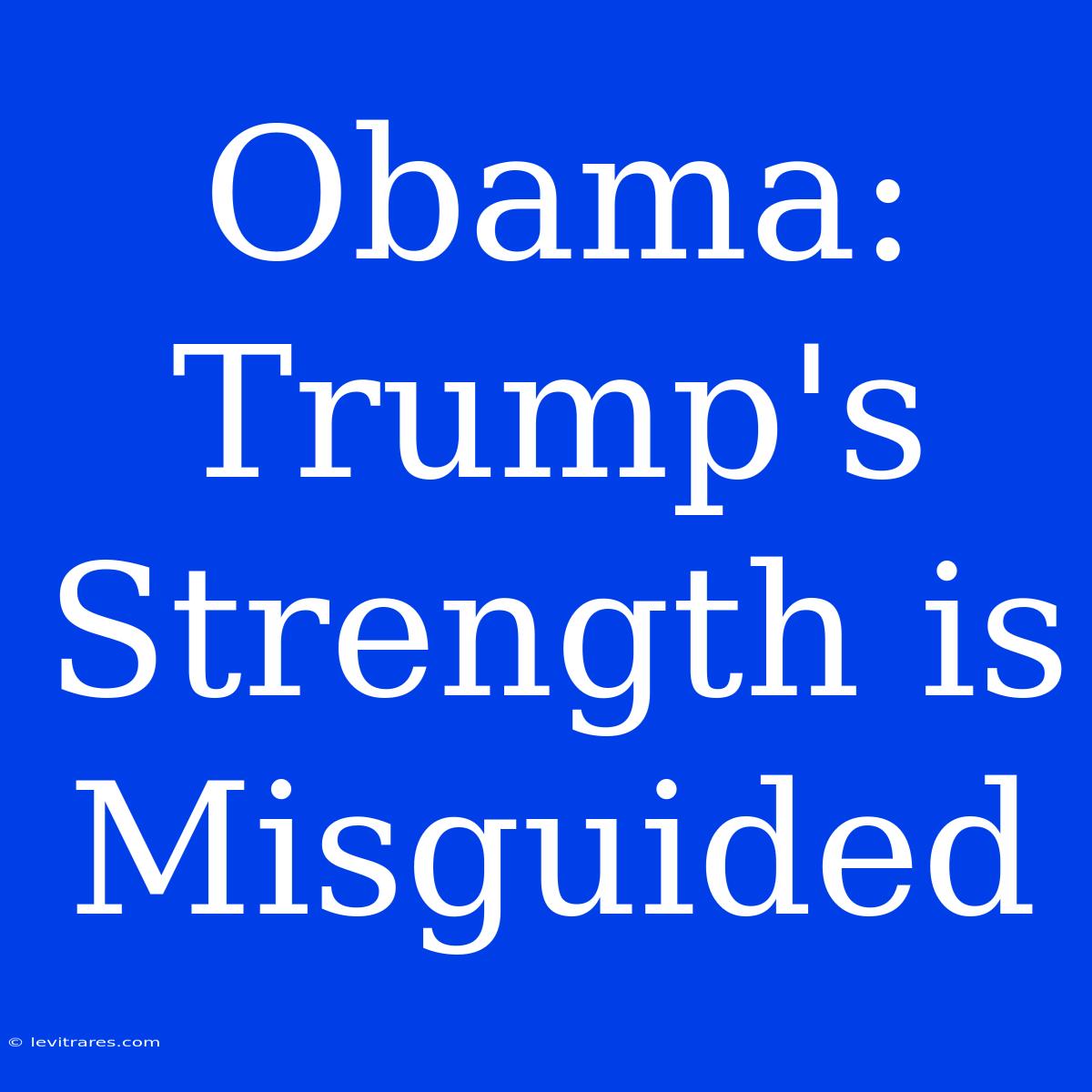Obama: Trump's Strength is Misguided – An Analysis of the Former President's Perspective
Can a nation truly be strong by turning inward? Former President Barack Obama's perspective on President Trump's "strength" offers a critical analysis of a divisive approach to leadership.
Editor Note: Obama's remarks on Trump's approach to leadership, delivered during a recent speech, highlight a stark contrast between two distinct philosophies.
This topic is crucial to understand because it delves into the very essence of national leadership and global power. It examines whether isolationism truly builds strength or whether engagement with the world is essential for progress. By analyzing Obama's critique, we can gain insights into the complex interplay of domestic politics and international relations.
Our Analysis: This analysis dives into Obama's speech, examining the key points he raises regarding Trump's leadership and its impact on the United States' global standing. We'll explore the historical context of this debate, analyze the strengths and weaknesses of each approach, and ultimately offer a nuanced understanding of the ongoing conversation surrounding national strength in the modern era.
Key Takeaways from Obama's Critique:
| Point | Description |
|---|---|
| Isolationism vs. Global Engagement | Obama highlights the contrast between Trump's inward-looking approach and his own belief in the importance of international cooperation. |
| Economic Interdependence | Obama emphasizes that the US economy benefits from global trade and interconnectedness, arguing that isolationism would weaken the country's economic power. |
| Security Threats | Obama asserts that the US faces complex security threats, including terrorism and climate change, that require multilateral solutions and international collaboration. |
Trump's Approach to Strength
Obama's analysis centers on Trump's emphasis on "America First" policies, characterized by withdrawing from international agreements, imposing tariffs, and pursuing unilateral action. This approach, Obama argues, creates a perception of strength that is ultimately misguided and harmful.
Facets of Trump's Approach:
- "America First" Policies: These policies aim to prioritize domestic interests above international cooperation, often at the expense of long-standing alliances and agreements.
- Trade Wars: Trump's imposition of tariffs on goods from key trading partners has led to retaliatory measures, creating economic uncertainty and undermining global trade.
- Isolationism: Withdrawal from international organizations like the Paris Climate Agreement and the Iran nuclear deal signals a retreat from global leadership and a lack of commitment to tackling shared challenges.
Summary: Obama's critique suggests that Trump's emphasis on "America First" policies, while appealing to some, ultimately weakens the US in the long run by undermining its global relationships and economic standing.
Obama's Vision of Strength
Obama emphasizes the importance of global leadership, based on the belief that the US can best secure its interests by working collaboratively with other nations. This vision centers on engagement, diplomacy, and the pursuit of shared goals.
Facets of Obama's Vision:
- Multilateralism: Emphasis on working with other nations through organizations like the United Nations, NATO, and the World Trade Organization to address global challenges.
- Diplomacy: Prioritizing diplomatic solutions over military action to resolve conflicts and build lasting peace.
- International Cooperation: Recognizing the interconnectedness of the world and the need to address issues like climate change, poverty, and disease through global collaboration.
Summary: Obama's vision of strength emphasizes the role of the US as a global leader, working with other nations to create a more secure, prosperous, and equitable world.
Conclusion
Obama's analysis of Trump's "strength" offers a valuable framework for understanding the ongoing debate surrounding national leadership in the 21st century. The choice between isolationism and global engagement carries significant implications for the US's role in the world, its economy, and its security. Obama's critique underscores the importance of considering long-term consequences when shaping foreign policy, emphasizing that true strength lies not in isolation but in collaborative leadership and international cooperation.
Call to Action: This debate goes beyond political affiliations. As citizens, we must engage in critical thinking, examining the long-term implications of policies that impact our nation's role in the world. The future of the US, and indeed the world, depends on our ability to navigate these complex issues through reasoned discourse and a commitment to shared solutions.

